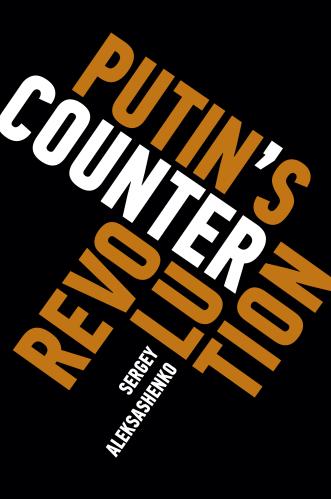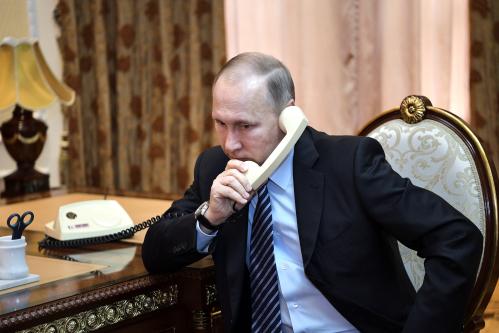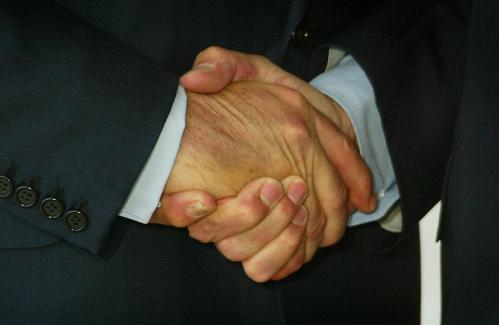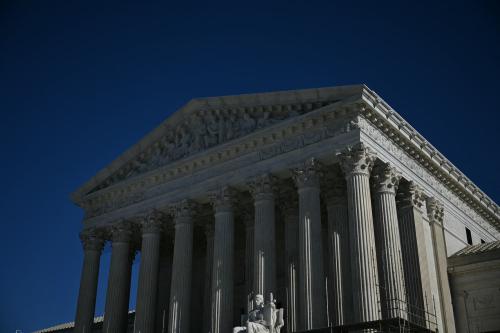This op-ed was originally published by Project Syndicate on February 21, 2018.
The outcome of Russia’s presidential election on March 18 is a foregone conclusion: The incumbent, Vladimir Putin, will win after garnering 5-6 times more votes than the second-place candidate. Elections in Russia today are no more fair, free, or competitive than in Soviet times. The only difference is that only one candidate was on the ballot back then, whereas nowadays there are several, to make the exercise seem more credible.
Another certainty about the upcoming election is that Putin will once again reincarnate himself, as he has done four times already. His earlier rebirths came in late October 2003, after the arrest of the now-exiled oligarch Mikhail Khodorkovsky, then in 2004, when another new-model Putin emerged for that year’s election. After the 2008 election, Putin had to find ways to manage Russia’s newly elected president, Dmitry Medvedev. And then in 2012, a belligerent Putin—the one who would later invade Ukraine—rallied his supporters on Moscow’s Poklonnaya Gora plaza, overcame mass protests, and returned to the presidency.
Despite his knack for transformation, Putin is unlikely to introduce any substantive policy reversals after his coming victory. Bold, comprehensive reforms of the type proposed by the liberal former finance minister Alexei Kudrin are not in the cards. Putin is an old dog; he will not learn new tricks.
To predict what Putin might do in his next term in office, consider five trends that have defined Russia during his 18-year rule. The first is escalation of political and military confrontation with the West, which has turned Russia into a rogue state that threatens its neighbors. The second is a gradual consolidation of power in the hands of a small circle of elites, who have replaced the bureaucracy, parliament, and judiciary as Russia’s ultimate decision-makers.
In 2024, will the leader of Russia be Putin 5.0, or someone else? Whatever happens, we can be sure that with every passing day, Putin will become increasingly preoccupied with his existential quandary: What next?
A third trend is growing reliance on the use of force, particularly on the part of the secret police, in political life. With little or even no evidence, the Federal Security Service (FSB), the successor to the KGB, may now jail federal ministers, regional governors, opposition leaders, theater directors, environmental activists, or ordinary Russian citizens who express political views on Twitter or Facebook.
A fourth, and related, trend is the restriction of constitutionally guaranteed freedoms, including voting rights and rights of expression and assembly. And a final trend is the gradual erosion of property rights, which has left Russian businessmen unwilling to invest in the country.
All of these negative trends will persist, even if the pace of decline is debatable. Putin’s re-election almost certainly means another six years of economic stagnation and international isolation. He may speak about the need for reform; but after nearly a generation in power, his words can no longer be trusted. To divine his intentions and future policies requires focusing on his actions—what he does, not what he says. In my view, there are four plausible scenarios.
First, Putin would seek to position himself as president for life, by holding a referendum to eliminate the constitutional limit of two consecutive presidential terms. Or he could be elected as the president of the Union State of Russia and Belarus, with Belarus’s current president, Alexander Lukashenko, serving as prime minister. The Union State has been dormant since 1997, but it could be revived to serve Putin’s purposes.
In the second scenario, Putin would become a Russian Deng Xiaoping. He would acknowledge that Russia’s current political model is unsustainable, and convene a “roundtable” of representatives from around the country to come up with a framework for a new system. The delegates could establish rules for a transitional period comprising the last two years of Putin’s presidency, after which Russia would enter a new political era.
Or, like Boris Yeltsin before him, Putin might declare himself exhausted and nominate a successor. In the third scenario, that successor might be a liberal like Medvedev, whereas in the fourth scenario, it would be a conservative like Deputy Prime Minister Dmitry Rogozin, who currently oversees the defense industry.
In these last two scenarios, it doesn’t really matter whether the successor is a liberal or conservative. What matters is whether either type of leader could retain power once in office. Neither a Medvedev nor a Rogozin would be able to keep the current system as it is. But any reforms they might attempt would necessarily threaten powerful entrenched interests, and thus destabilize the existing balance of power. Moreover, it is unclear what kind of relationship Medvedev or Rogozin would have with the FSB, or whether either man could ensure the secret police’s noninterference in the country’s post-Putin political life.
I won’t speculate about which of these four scenarios is most likely. At any rate, they all raise the same question: In 2024, will the leader of Russia be Putin 5.0, or someone else? Whatever happens, we can be sure that with every passing day, Putin will become increasingly preoccupied with his existential quandary: What next?
The Brookings Institution is committed to quality, independence, and impact.
We are supported by a diverse array of funders. In line with our values and policies, each Brookings publication represents the sole views of its author(s).






Commentary
Op-edThe future of Putin’s illusion
March 19, 2018